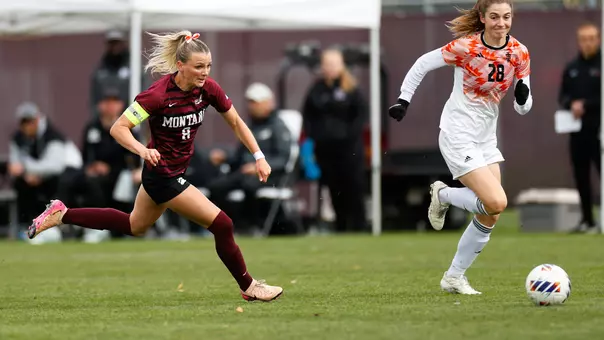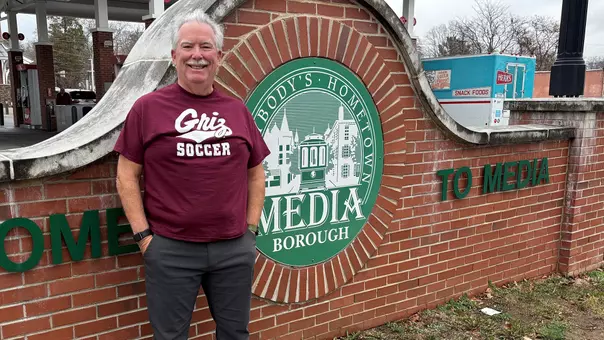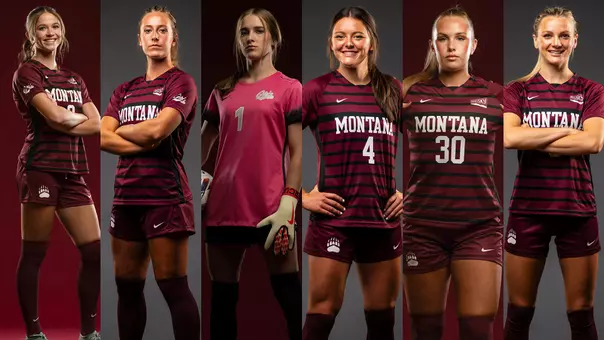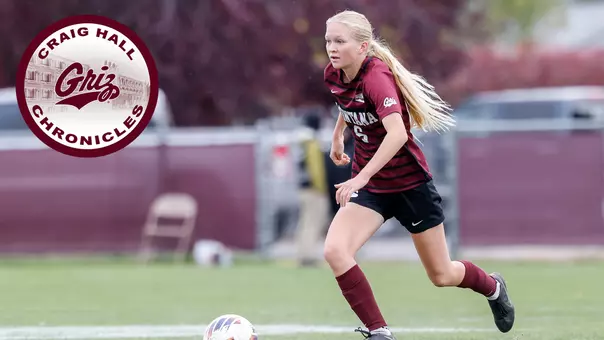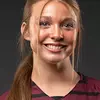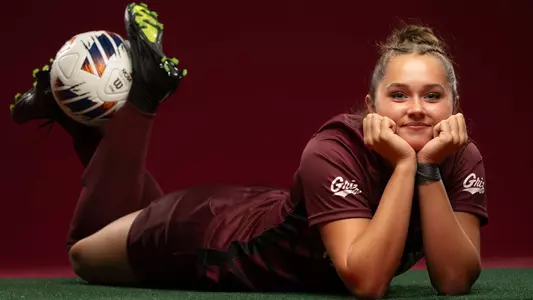
Photo by: Ryan Brennecke
The Craig Hall Chronicles :: Malli Rude
8/1/2025 6:35:00 PM | Soccer
It's that most wonderful time of the year, the return of the Craig Hall Chronicles, the annual series that introduces the Montana soccer program's freshmen to the world by trying to answer an all-encompassing question: So, what's her deal?
Malli Rude? A simple enough storyline, the daughter of a former soccer player at Washington (which is about .000001 percent the most interesting thing about Dr. Walburga "Wali" Martin, as you'll soon learn) who spent the spring semester at Portland before transferring to Montana.
She grew up in small-town Washington, in Prosser, outgrew the local leagues, flourished once she made the commitment to playing club soccer in Seattle, for Eastside, then Seattle United, now she's here, a freshman who could pass as a senior if you're evaluating that on size, strength and speed.
She was brought here with an eye on the future, of one day replacing the great Maddie Ditta in the midfield, was told that straight up, was presented with a plan of what the next four years could look like. That in itself is one of the big reasons she is here, that level of openness and organization.
That's the nutshell version of Malli Rude, but that's not why we're here. We're here to invest some words (ours) and some time (yours), because it's the stories we're after, the ones that come together to answer that question we all have about her: No, really, what's her deal?
To do that, we need to start finding the threads that have been woven together over her 18 years, select the ones most meaningful to this story, then start lacing them back together, but be careful with that first one. That one's old and delicate and must be handled with absolute tenderness.
The Craig Hall Chronicles have gone generations deep before but not to the 1700s, not to Austria, because we might as well start with that name, her delightful christening and introduction to the world as Malli, the family surname that dates back centuries, that ties her to her grandmother's homeland.
Ah, her grandmother, a seamstress in the old country, minding her own business that day long ago when a chemist from the U.S. arrived, stayed at a local hostel, went out each night with the other young adults, the one she tried to set up with her friends, the one who had no interest in her friends, just her.
He brought her back to the U.S., to the Pacific Northwest, put his PhD in chemistry to work and together they got busy raising three children, Walburga arriving first, the one who took on her parents' strictness, their demand that academics are everything, and absolutely thrived, all of it propelling her forward.
"I wouldn't have had it any other way," says Wali, who grew up in Enumclaw. "I thrived in that environment." Proof: She earned an undergraduate degree in chemical engineering, worked, yawned, then went to medical school, challenges serving as her very life blood.
Sports? Well, they just get in the way of an education, but she wasn't going to be denied, taking that internal drive and applying it to soccer, drawn by the competitiveness of it all, trying out for the team at Washington when she was a freshman, dozens there, only two to be chosen. Of course, she made it.
It lasted two years, her career as a Husky, summer internships in her major taking priority after that, her degree later taking her to a job in Longview, Washington, home of Lower Columbia College and, hey, did you hear that the Red Devils were in need of soccer players?
She did and took enough classes at LCC on the side to be eligible to play and scored 24 goals as the team went 11-3-2 in 1997, the performance memorable enough that she was inducted into the school's hall of fame in 2023. She coached the team the following season, because of course she did.
Two (at Washington) plus one (at Lower Columbia College)? Hmm, that leaves her with one season of eligibility. She jokes about keeping it in her back pocket just in case the right opportunity comes her way. She laughs but doesn't seem to be joking.
Her company sends her to Little Rock, Arkansas, to work on a project. She plays soccer as a way of meeting people, tells one of them she's done with her current career. Maybe she'll get a business degree, maybe go to law school. A friend says, follow me, let me walk you around my hospital.
They stop outside one room busy with overwhelmed residents, the tension rising as the patient keeps trending in the wrong direction. He looks at Wali and asks her, what's wrong here? She calmly tells him, after doing a quick survey of the hospital room, that the patient's oxygen isn't connected.
So, she stayed, applying her equanimity and common sense to a new profession, graduating from the University of Arkansas Medical School, her path ultimately taking her to Prosser, population 6,000-ish, doctor and town fitting together like a hand and latex exam glove, the doctor doing a bit of everything.
"It fits her personality. She would hate having a specialized job," says Malli. "She needs things to stay interesting," which they did, particularly during harvest season when she worked nights in the ER. "Guys' hands would get caught in machinery. She loved doing it."
Finally, we can add kids to the picture, Paden, then Logan, whose middle and go-to name came from his great-grandparents, Johann and Rosa Mally, the y replacing the i at the end of the family name a century ago, then finally Malli, mom and daughter bonding on their very own island in a sea of testosterone.
"All I had were boys in my life. Boy cat, boy dog, boys, husband. Everything was boys," says Wali. "Then I had her. What do I do with this? She made me fall in love with pink again."
All the kids could do was hold on because Wali was going to expose them to everything she could. They visited other countries every summer – Malli figures she's been to 20 by now, including Austria – then spent every weekend back home packing up and heading out for whatever idea Wali had next.
"I grew up so lucky. Even then, I noticed we were different," says Malli. "Every weekend we'd go out in the woods and have adventures. All my classmates had never been on a plane, had never gone into the woods to do survival training.
"I was lucky to have a mom who taught me to fend for myself, to problem-solve when you think there is no answer. I was lucky to have that. She's been a very big influence in my life."
What emerged from that incubator of experiences that was dialed up to its highest setting: Wait, Is This Safe? Paden is a rescue swimmer with the U.S. Coast Guard, stationed in – OMG! – Kodiak, Alaska. Johann is in the ROTC while attending Central Washington, the goal to become a pilot in the Air Force.
And you want to mess with Malli on the soccer field? "Having two older brothers made her tough as nails," Wali says.
Of course, soccer was never the goal, not if mom had anything to say about it. "I was worried she would just be doing it to please me, so I totally wanted to get her off that table. That's why I kept pushing basketball," she says.
The sport hardly mattered. Asked if she experienced an ah-ha moment, when she noticed that her daughter had something special, Wali says pretty much Day 1 of any sport she tried. Soccer won her over but it could have been swimming, could have been basketball. She was just a natural.
"It was trying to figure out what she loved the most," says Wali, who coached Malli throughout, all the way to high school, when they sought out a trainer in the nearby Tri-Cities, who worked with the player and immediately told the family, this girl needs to get to Seattle.
"She was always better than anybody else on her team growing up," says Wali. "But we were in this small town, so it was just me as her coach until her freshman year of high school.
"We said, we've got to do something. There is no way colleges are going to come to Prosser. With her size and speed, we said, I bet she could do Division I."
She started at Eastside, the club most conveniently located, in Seattle but not IN Seattle, but still a two-and-a-half-hour drive each way from Prosser. All of a sudden the game was faster, the players holding a higher skill level, kids who could match her size, speed and strength. She was gaga.
"I was surrounded by teammates I could count on to take care of the ball," she says, like Mia Draper, who was teammates with Rude at Eastside, then at Seattle United, on a national ODP team that traveled to Costa Rica, now at Montana.
"On my Seattle teams, I could pass to a person and I could trust them to get it back to me. It was a big relief. Soccer is way better that way. I loved it. I thought, this is where I belong. I fit in right away."
And, so it began. Outside of the three-month high school season, when clubs step back and allow players to experience the joys of competing with sometimes lifelong friends and for their schools, it was traveling to Seattle three times per week.
She did the math when preparing her graduation speech, determined the time invested was the equivalent of spending 125 days in whatever vehicle did the dirty work, up 82 to Yakima, then north to 90, up and over Snoqualmie Pass. Repeat and repeat and repeat and repeat, 3,000 hours of repeat.
"I don't know how we did it," she says. Her mom does. She told her daughter it's either this or college. If it works out, maybe the former will lead to the latter. "We're either going to pay now for your hotels and travel or we're going to pay for your college later, so pick one. She said, I want to play soccer."
If this paints a picture of a girl who was unstoppable, unshakeable, who never flinched, no matter the situation, who rose up the youth soccer ranks, always expecting nothing less, full of confidence that she was destined for greatness, this article has failed. Malli Rude is simply flesh and blood.
Prosser to Eastside? Eastside to Seattle United? The state ODP team? Tryouts for the region ODP team? Tryouts for the national ODP team? Each was a mountain in front of her path, certainly this one unscalable. Unless she had a guide, Wali serving as faithful Sherpa.
I can't compete at this next level, she would think, filling herself to overflowing with anxiety. "I didn't believe in myself, but my mom did. I discovered things about myself I didn't know I was capable of. Thank God for her," says Malli.
It was always the same: doubt, fight through it and do it anyway, then excel. "In the end, she stepped on the field and always performed," says Wali. "She was never intimidated once she was on the field. She never played below her level.
"That's something I didn't have as an athlete. If I played against somebody who was better than me, I would not be as good. When Malli plays against somebody who's better than she is, she gets to their level. Or dies trying. I wish I would have had more of that when I was in college."
It was the University of Portland that won her over, the school checking off the boxes that she determined were most important, namely that she wanted to love the campus first and foremost, and who wouldn't like this school tucked in a quiet neighborhood, rising above the Willamette River?
"Can I live here for four years? This place is beautiful. Of course, I can live here," she says, hinting, without going into detail, that there were other things she could have looked into deeper. "I loved my experience but it just wasn't the right fit."
It put her in an odd position, a player in the transfer portal with really nothing to show for the time invested, enrolling as she did for only the spring semester, never playing a regular-season game with the Pilots. She came out of it still a freshman in eligibility but with plenty of experience, on the field and off.
"It was such a weird position to be in. I hadn't done anything. Thankfully my coach on Seattle United, Rich Reese, started contacting colleges," she says. "I didn't know if people were going to call me or even recognize me. That was very stressful."
When her name finally showed up in the portal, Montana coach Chris Citowicki didn't need to do very much homework. He'd been watching Draper play for years, always alongside Rude, but once she had committed to Portland, he turned his focus to other players.
"Her name pops up and I'm thinking, I should reach out," the coach says. "I pull up her information right as the phone rings. It's her club coach, Rich. Have you heard of Malli? Wait, are you in my office? She's on my screen right now.
"I watched that team so much, I knew of her, but once somebody's committed, you turn your focus to other players."
Mom and daughter game-planned it, put together an itinerary. Montana wanted her to visit, Indiana, California, Washington State. Idaho was coming after her hard. "We talked about it. How can we do it differently this time?" Wali says. "We'll just do the best we can."
Montana was first. There would be no second. It was so open and shut that she called the other schools and said she was canceling her visits. Um, did you see the list of schools in the paragraph above? Nobody does that unless something special has just happened.
"I believe everything happens for a reason and where I'm at now, I couldn't be happier. I've found my people," Malli says. "This is it. I just love it."
Let's turn it over to Wali to give those sentiments a bit of depth, a little more explanation. "The biggest thing I noticed is that Chris has plan," she says. "He has structure, he has very specific rules and requirements and expectations, and his expectations are completely clear.
"That's what made me say yes to Montana. It was so different from other schools. They didn't line anything out like that. That's what drew me as a parent to Montana versus any other school.
"They have a plan. That's what helps a team win, if the coach has a system, a plan that works for them, that they follow along. Usually those are the successful teams. That's my opinion."
It's a let's-feel-this-out scenario on both sides, right? Mother and daughter visit, and Citowicki is taking everything in as well, like asking if Wali hiked to the M behind campus earlier that day. She did, then she kept going to the top of Mount Sentinel and back down the Smokejumper Trail.
Chris, meet Wali, who will never be able to surprise the coach again with anything she does. "She's something else," he says. And then they got down to specifics, of Ditta, now a senior, and what Montana saw for Rude this year, next year, as an upperclassman, what she could accomplish as a Grizzly.
"He is very forthcoming, which I could not be more thankful for," says Rude. "Now I know what to expect, that I'm going to be groomed for her position. It's stressful because she is an unreal player. She is irreplaceable, so I have to figure out a way to somehow reach the level she's at.
"I'm excited for the challenge. It's going to be a big one." But it's the Montana way. How will they ever replace Taylor Hansen? With Ava Samuelson. How are they ever going to replace Claire Howard? With Camellia Xu. How are they ever going to replace Maddie Ditta?
"For the consistency of the program, there has to be somebody who is sitting there waiting, saying, now it's my turn," says Citowicki. "That's why Malli's here. It will be her turn at some point. I'm excited to see how good she is going to be."
That applies to all of them, these freshmen, from Rude to Stendera to Slater to Draper to Johnson to Miliffe to Grant and finally to Thorne-Thomsen, new faces who will one day fill in for those more familiar, ready for their time to arrive. Eight Craig Hall Chronicles. One down, seven stories to go.
Malli Rude? A simple enough storyline, the daughter of a former soccer player at Washington (which is about .000001 percent the most interesting thing about Dr. Walburga "Wali" Martin, as you'll soon learn) who spent the spring semester at Portland before transferring to Montana.
She grew up in small-town Washington, in Prosser, outgrew the local leagues, flourished once she made the commitment to playing club soccer in Seattle, for Eastside, then Seattle United, now she's here, a freshman who could pass as a senior if you're evaluating that on size, strength and speed.
She was brought here with an eye on the future, of one day replacing the great Maddie Ditta in the midfield, was told that straight up, was presented with a plan of what the next four years could look like. That in itself is one of the big reasons she is here, that level of openness and organization.
That's the nutshell version of Malli Rude, but that's not why we're here. We're here to invest some words (ours) and some time (yours), because it's the stories we're after, the ones that come together to answer that question we all have about her: No, really, what's her deal?
To do that, we need to start finding the threads that have been woven together over her 18 years, select the ones most meaningful to this story, then start lacing them back together, but be careful with that first one. That one's old and delicate and must be handled with absolute tenderness.
The Craig Hall Chronicles have gone generations deep before but not to the 1700s, not to Austria, because we might as well start with that name, her delightful christening and introduction to the world as Malli, the family surname that dates back centuries, that ties her to her grandmother's homeland.
Ah, her grandmother, a seamstress in the old country, minding her own business that day long ago when a chemist from the U.S. arrived, stayed at a local hostel, went out each night with the other young adults, the one she tried to set up with her friends, the one who had no interest in her friends, just her.
He brought her back to the U.S., to the Pacific Northwest, put his PhD in chemistry to work and together they got busy raising three children, Walburga arriving first, the one who took on her parents' strictness, their demand that academics are everything, and absolutely thrived, all of it propelling her forward.
"I wouldn't have had it any other way," says Wali, who grew up in Enumclaw. "I thrived in that environment." Proof: She earned an undergraduate degree in chemical engineering, worked, yawned, then went to medical school, challenges serving as her very life blood.
Sports? Well, they just get in the way of an education, but she wasn't going to be denied, taking that internal drive and applying it to soccer, drawn by the competitiveness of it all, trying out for the team at Washington when she was a freshman, dozens there, only two to be chosen. Of course, she made it.
It lasted two years, her career as a Husky, summer internships in her major taking priority after that, her degree later taking her to a job in Longview, Washington, home of Lower Columbia College and, hey, did you hear that the Red Devils were in need of soccer players?
She did and took enough classes at LCC on the side to be eligible to play and scored 24 goals as the team went 11-3-2 in 1997, the performance memorable enough that she was inducted into the school's hall of fame in 2023. She coached the team the following season, because of course she did.
Two (at Washington) plus one (at Lower Columbia College)? Hmm, that leaves her with one season of eligibility. She jokes about keeping it in her back pocket just in case the right opportunity comes her way. She laughs but doesn't seem to be joking.
Her company sends her to Little Rock, Arkansas, to work on a project. She plays soccer as a way of meeting people, tells one of them she's done with her current career. Maybe she'll get a business degree, maybe go to law school. A friend says, follow me, let me walk you around my hospital.
They stop outside one room busy with overwhelmed residents, the tension rising as the patient keeps trending in the wrong direction. He looks at Wali and asks her, what's wrong here? She calmly tells him, after doing a quick survey of the hospital room, that the patient's oxygen isn't connected.
So, she stayed, applying her equanimity and common sense to a new profession, graduating from the University of Arkansas Medical School, her path ultimately taking her to Prosser, population 6,000-ish, doctor and town fitting together like a hand and latex exam glove, the doctor doing a bit of everything.
"It fits her personality. She would hate having a specialized job," says Malli. "She needs things to stay interesting," which they did, particularly during harvest season when she worked nights in the ER. "Guys' hands would get caught in machinery. She loved doing it."
Finally, we can add kids to the picture, Paden, then Logan, whose middle and go-to name came from his great-grandparents, Johann and Rosa Mally, the y replacing the i at the end of the family name a century ago, then finally Malli, mom and daughter bonding on their very own island in a sea of testosterone.
"All I had were boys in my life. Boy cat, boy dog, boys, husband. Everything was boys," says Wali. "Then I had her. What do I do with this? She made me fall in love with pink again."
All the kids could do was hold on because Wali was going to expose them to everything she could. They visited other countries every summer – Malli figures she's been to 20 by now, including Austria – then spent every weekend back home packing up and heading out for whatever idea Wali had next.
"I grew up so lucky. Even then, I noticed we were different," says Malli. "Every weekend we'd go out in the woods and have adventures. All my classmates had never been on a plane, had never gone into the woods to do survival training.
"I was lucky to have a mom who taught me to fend for myself, to problem-solve when you think there is no answer. I was lucky to have that. She's been a very big influence in my life."
What emerged from that incubator of experiences that was dialed up to its highest setting: Wait, Is This Safe? Paden is a rescue swimmer with the U.S. Coast Guard, stationed in – OMG! – Kodiak, Alaska. Johann is in the ROTC while attending Central Washington, the goal to become a pilot in the Air Force.
And you want to mess with Malli on the soccer field? "Having two older brothers made her tough as nails," Wali says.
Of course, soccer was never the goal, not if mom had anything to say about it. "I was worried she would just be doing it to please me, so I totally wanted to get her off that table. That's why I kept pushing basketball," she says.
The sport hardly mattered. Asked if she experienced an ah-ha moment, when she noticed that her daughter had something special, Wali says pretty much Day 1 of any sport she tried. Soccer won her over but it could have been swimming, could have been basketball. She was just a natural.
"It was trying to figure out what she loved the most," says Wali, who coached Malli throughout, all the way to high school, when they sought out a trainer in the nearby Tri-Cities, who worked with the player and immediately told the family, this girl needs to get to Seattle.
"She was always better than anybody else on her team growing up," says Wali. "But we were in this small town, so it was just me as her coach until her freshman year of high school.
"We said, we've got to do something. There is no way colleges are going to come to Prosser. With her size and speed, we said, I bet she could do Division I."
She started at Eastside, the club most conveniently located, in Seattle but not IN Seattle, but still a two-and-a-half-hour drive each way from Prosser. All of a sudden the game was faster, the players holding a higher skill level, kids who could match her size, speed and strength. She was gaga.
"I was surrounded by teammates I could count on to take care of the ball," she says, like Mia Draper, who was teammates with Rude at Eastside, then at Seattle United, on a national ODP team that traveled to Costa Rica, now at Montana.
"On my Seattle teams, I could pass to a person and I could trust them to get it back to me. It was a big relief. Soccer is way better that way. I loved it. I thought, this is where I belong. I fit in right away."
And, so it began. Outside of the three-month high school season, when clubs step back and allow players to experience the joys of competing with sometimes lifelong friends and for their schools, it was traveling to Seattle three times per week.
She did the math when preparing her graduation speech, determined the time invested was the equivalent of spending 125 days in whatever vehicle did the dirty work, up 82 to Yakima, then north to 90, up and over Snoqualmie Pass. Repeat and repeat and repeat and repeat, 3,000 hours of repeat.
"I don't know how we did it," she says. Her mom does. She told her daughter it's either this or college. If it works out, maybe the former will lead to the latter. "We're either going to pay now for your hotels and travel or we're going to pay for your college later, so pick one. She said, I want to play soccer."
If this paints a picture of a girl who was unstoppable, unshakeable, who never flinched, no matter the situation, who rose up the youth soccer ranks, always expecting nothing less, full of confidence that she was destined for greatness, this article has failed. Malli Rude is simply flesh and blood.
Prosser to Eastside? Eastside to Seattle United? The state ODP team? Tryouts for the region ODP team? Tryouts for the national ODP team? Each was a mountain in front of her path, certainly this one unscalable. Unless she had a guide, Wali serving as faithful Sherpa.
I can't compete at this next level, she would think, filling herself to overflowing with anxiety. "I didn't believe in myself, but my mom did. I discovered things about myself I didn't know I was capable of. Thank God for her," says Malli.
It was always the same: doubt, fight through it and do it anyway, then excel. "In the end, she stepped on the field and always performed," says Wali. "She was never intimidated once she was on the field. She never played below her level.
"That's something I didn't have as an athlete. If I played against somebody who was better than me, I would not be as good. When Malli plays against somebody who's better than she is, she gets to their level. Or dies trying. I wish I would have had more of that when I was in college."
It was the University of Portland that won her over, the school checking off the boxes that she determined were most important, namely that she wanted to love the campus first and foremost, and who wouldn't like this school tucked in a quiet neighborhood, rising above the Willamette River?
"Can I live here for four years? This place is beautiful. Of course, I can live here," she says, hinting, without going into detail, that there were other things she could have looked into deeper. "I loved my experience but it just wasn't the right fit."
It put her in an odd position, a player in the transfer portal with really nothing to show for the time invested, enrolling as she did for only the spring semester, never playing a regular-season game with the Pilots. She came out of it still a freshman in eligibility but with plenty of experience, on the field and off.
"It was such a weird position to be in. I hadn't done anything. Thankfully my coach on Seattle United, Rich Reese, started contacting colleges," she says. "I didn't know if people were going to call me or even recognize me. That was very stressful."
When her name finally showed up in the portal, Montana coach Chris Citowicki didn't need to do very much homework. He'd been watching Draper play for years, always alongside Rude, but once she had committed to Portland, he turned his focus to other players.
"Her name pops up and I'm thinking, I should reach out," the coach says. "I pull up her information right as the phone rings. It's her club coach, Rich. Have you heard of Malli? Wait, are you in my office? She's on my screen right now.
"I watched that team so much, I knew of her, but once somebody's committed, you turn your focus to other players."
Mom and daughter game-planned it, put together an itinerary. Montana wanted her to visit, Indiana, California, Washington State. Idaho was coming after her hard. "We talked about it. How can we do it differently this time?" Wali says. "We'll just do the best we can."
Montana was first. There would be no second. It was so open and shut that she called the other schools and said she was canceling her visits. Um, did you see the list of schools in the paragraph above? Nobody does that unless something special has just happened.
"I believe everything happens for a reason and where I'm at now, I couldn't be happier. I've found my people," Malli says. "This is it. I just love it."
Let's turn it over to Wali to give those sentiments a bit of depth, a little more explanation. "The biggest thing I noticed is that Chris has plan," she says. "He has structure, he has very specific rules and requirements and expectations, and his expectations are completely clear.
"That's what made me say yes to Montana. It was so different from other schools. They didn't line anything out like that. That's what drew me as a parent to Montana versus any other school.
"They have a plan. That's what helps a team win, if the coach has a system, a plan that works for them, that they follow along. Usually those are the successful teams. That's my opinion."
It's a let's-feel-this-out scenario on both sides, right? Mother and daughter visit, and Citowicki is taking everything in as well, like asking if Wali hiked to the M behind campus earlier that day. She did, then she kept going to the top of Mount Sentinel and back down the Smokejumper Trail.
Chris, meet Wali, who will never be able to surprise the coach again with anything she does. "She's something else," he says. And then they got down to specifics, of Ditta, now a senior, and what Montana saw for Rude this year, next year, as an upperclassman, what she could accomplish as a Grizzly.
"He is very forthcoming, which I could not be more thankful for," says Rude. "Now I know what to expect, that I'm going to be groomed for her position. It's stressful because she is an unreal player. She is irreplaceable, so I have to figure out a way to somehow reach the level she's at.
"I'm excited for the challenge. It's going to be a big one." But it's the Montana way. How will they ever replace Taylor Hansen? With Ava Samuelson. How are they ever going to replace Claire Howard? With Camellia Xu. How are they ever going to replace Maddie Ditta?
"For the consistency of the program, there has to be somebody who is sitting there waiting, saying, now it's my turn," says Citowicki. "That's why Malli's here. It will be her turn at some point. I'm excited to see how good she is going to be."
That applies to all of them, these freshmen, from Rude to Stendera to Slater to Draper to Johnson to Miliffe to Grant and finally to Thorne-Thomsen, new faces who will one day fill in for those more familiar, ready for their time to arrive. Eight Craig Hall Chronicles. One down, seven stories to go.
Players Mentioned
UM vs SDSU Highlights
Monday, December 08
Griz Football Press Conference 12-1-25
Monday, December 01
2025 Brawl of the Wild Trailer
Friday, November 21
Griz Football weekly press conference 11-17-25
Monday, November 17

